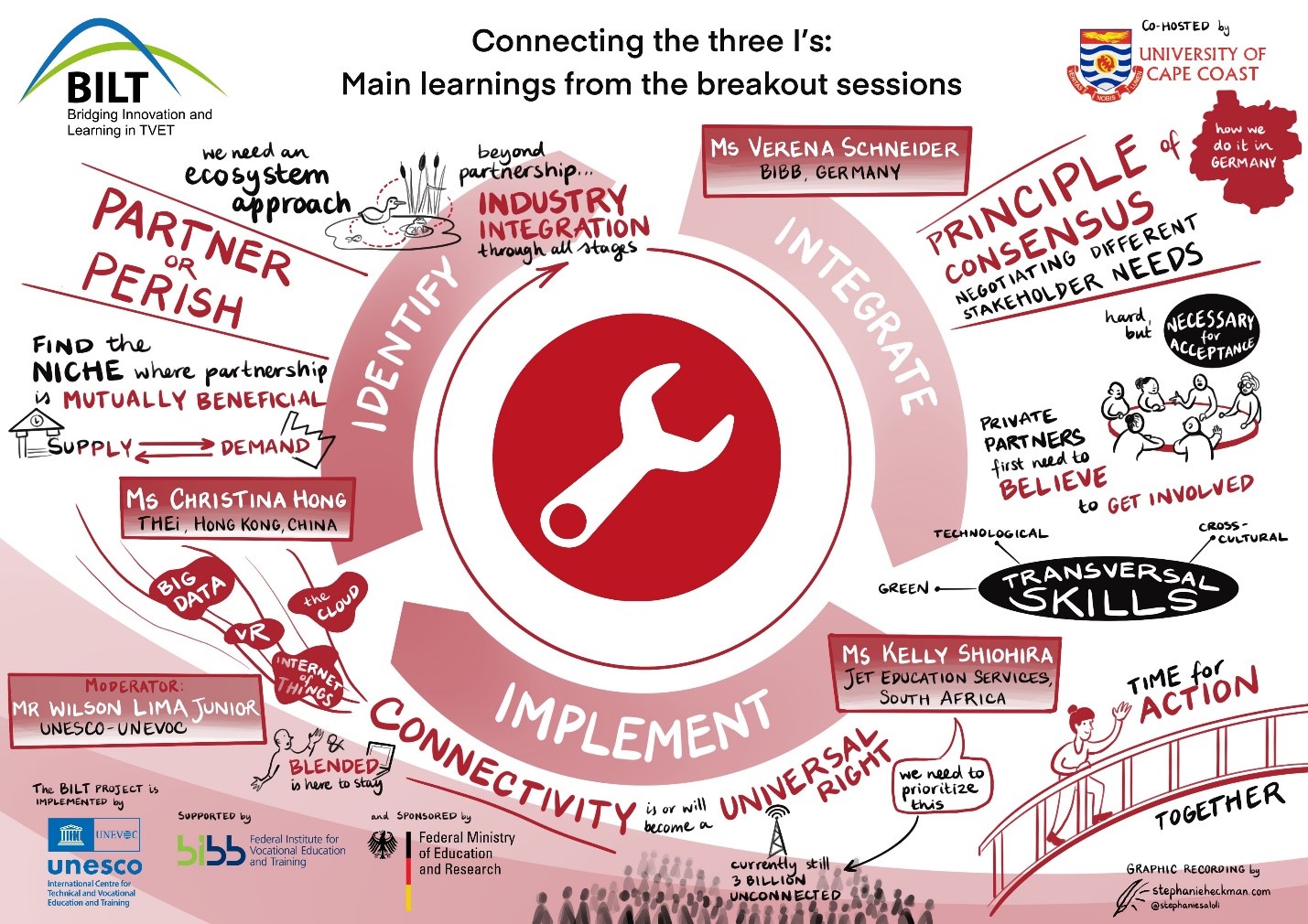
The UNESCO-UNEVOC International Centre: Who We Are | What We Do | Working With Us | Get in Touch
The UNEVOC Network: Learn About the Network | UNEVOC Network Directory
For Members: UNEVOC Centre Dashboard
Thematic Areas: Inclusion and Youth | Digital Transformation | Private Sector Engagement | SDGs and Greening TVET
Our Key Programmes & Projects: BILT: Bridging Innovation and Learning in TVET | Building TVET resilience | TVET Leadership Programme | WYSD: World Youth Skills Day
Past Activities: COVID-19 response | i-hubs project | TVET Global Forums | Virtual Conferences | YEM Knowledge Portal
Our Services & Resources: Publications | TVET Forum | TVET Country Profiles | TVETipedia Glossary | Innovative and Promising Practices | Toolkits for TVET Providers | Entrepreneurial Learning Guide
Events: Major TVET Events | UNEVOC Network News

UNESCO-UNEVOC’s Bridging Innovation and Learning in TVET (BILT) project supports TVET stakeholders to address current challenges in TVET systems by providing them with a platform to explore and support the process of identification, integration, and implementation of new qualifications and competencies (the ‘Three I’s’).
The BILT ‘bridging conferences’ are one of several aspects of the BILT project, which contribute to strengthening the European, African and Asian regions of the UNEVOC Network and enable peer learning and knowledge exchange. The theme of the 2021 bridging conferences is: New Qualifications and Competencies in TVET(NQCs) – the overarching BILT thematic area, which is supported by four work streams: Digitalization, Greening, Entrepreneurship, and Migration.
A major outcome of the bridging events is the identification of successful TVET initiatives shared by the UNEVOC Network and beyond, and documented as ‘Innovation and Learning Practices’.
April 2021: Bridging Asia-Pacific and Europe
On 27 and 28 April 2021, the BILT project team together with Temasek Polytechnic, a UNEVOC Centre from Singapore, co-hosted the Bridging Asia-Pacific and Europe: New Qualifications and Competencies in TVET conference, a high-level 3D online event that featured over 440 participants. The discussions revolved around how to identify NQCs, integrate them into curricula and training regulations, and implement them in teaching and training practice in a timely and accurate manner. Experts and TVET practitioners illustrated this challenge with successful examples in the areas of greening, digitalization, entrepreneurship and migration.
Stakeholders from both regions provided a range of interesting viewpoints. A point of consensus was the need to shorten the line of sight between the skills demand and supply through the use of big data, the development of institutional arrangements conducive for information exchange among stakeholders, and the enlargement of stakeholders involved in the development of occupational profiles, which can allow a timelier and more accurate identification of NQCs. For TVET graduates to get the right skills to match the industry demands, a crucial factor is the additional support provided to TVET staff. TVET teachers and trainers need to closely follow the latest industry trends and insights and ensure that the instruction is up-to-date.
June 2021: Bridging Africa and Europe
Coming six weeks after the Asia-Pacific and Europe conference, the Bridging Africa and Europe: New Qualifications and Competencies in TVET conference featured nearly 460 participants logging in from more than 90 countries. The conference was co-hosted by the University of Cape Coast (Ghana), a UNEVOC Centre. Experts and TVET practitioners from Africa and Europe explored challenges and practical solutions in the area of NQCs with a focus on the role of social partners, including the private sector. The presented examples showed that public-private partnerships in TVET contribute to quality assurance in the development of NQCs. Building strong relationships with social partners helps ensure that TVET qualifications are demand-oriented and TVET graduates get the right skills.
The conference audience had an opportunity to delve into the Three I’s framework focusing on the ecosystem approach, where the demand and the supply side of the skills ecosystem are closely interlinked and composed of several co-dependent stakeholders such as government, social partners, private sector, TVET providers, students, teachers, families and communities. Furthermore, to build on the preliminary findings of the three-volume guide recently being developed by the BILT experts group, panelists discussed the characteristics of a flexible TVET system that can adopt relevant and future-oriented qualifications and competencies in the midst of a fast-evolving technological environment. The discussions revolved around the use of big data and technology for skills anticipation, future gazing, the use of VR in teaching and training, and the problems of connectivity and the right to internet access.

December 2021: Global Learning Forum
The third BILT bridging conference this year is scheduled for 7-9 December 2021 (tbc). It will bring together TVET stakeholders from all over the world and will feature the full findings of the BILT expert group on the Three I’s: identifying, integrating and implementing new qualifications and competencies in TVET.
Join us in December for an exchange of innovative ideas and experiences among TVET stakeholders to enhance peer learning!
Learn more about the BILT project